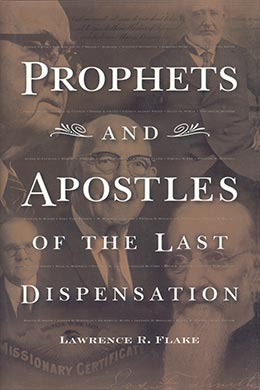Joseph Fielding Smith
Lawrence R. Flake, Prophets and Apostles of the Last Dispensation (Provo, UT: Religious Studies Center, Brigham Young University, 2001), 95–103.
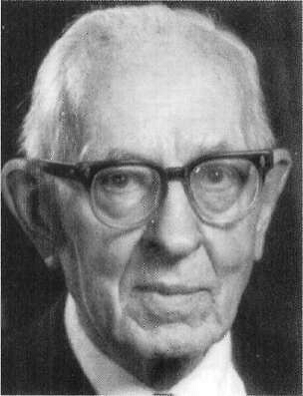
Born: 19 July 1876, Salt Lake City, Utah
Quorum of the Twelve Apostles: 7 April 1910 (age 33)
Acting President of the Quorum of the Twelve: 30 September 1950
President of the Quorum of the Twelve: 9 April 1951
Additional counselor in the First Presidency to David O. McKay and President of the Quorum of the Twelve: 29 October 1965
President of the Church: 23 January 1970 (age 93)
Died: 2 July 1972 (age 95), Salt Lake City, Utah
When Joseph Fielding Smith became president of the Church on 23 January 1970, some members wondered why the Lord chose him to be president of the Church; why at ninety-three years of age were the burdens of the kingdom placed on his shoulders? There were many answers to this question. An article in the Church Section of the Deseret News stated: “In preserving President Smith to succeed his illustrious predecessor, President David O. McKay, the Lord maintains an invaluable bridge over the generations, still holding us close to the Prophet Joseph Smith and the fundamentals of our divinely founded faith. . . . President Smith’s own father knew the Prophet well, as a boy, and he knew the Prophet’s family too. President Smith’s father, who lived through the martyrdom in which he lost his own father, the Patriarch, bore constant testimony to Joseph Fielding Smith concerning the reality of the work.”[1]
President Harold B. Lee gave his testimony of the Lord’s will in the calling of so old a man to hold this most demanding office: “[The Lord] knows whom he wants to preside over this church, and he will make no mistake. The Lord doesn’t do things by accident. He has never done anything accidentally.”[2]
The Lord purposely spared the life of Joseph Fielding Smith, who outlived fifteen of the apostles called after him and was in the Quorum of the Twelve longer than any man in this dispensation, having been ordained on 7 April 1910. The Lord preserved him so that for two and a half years he could preside over the Church, lending to the Saints his tremendous understanding of Church doctrine and knowledge of the scriptures, his orthodoxy, and his uncompromising commitment to revealed truth.
During his term as president, another side of his nature became abundantly evident to those members of the Church who might have mistaken his seriousness for austerity. He was full of love, tenderness, gentleness, and kindness toward his fellowmen. He often counseled the priesthood brethren that if they ever make a mistake in judgment, it should be on the side of mercy. President Smith was known among his associates and his large family of eleven children, numerous grandchildren, great-grandchildren, and great-great-grandchildren as a most benevolent and merciful servant of God. His second wife, Ethel, wrote: “The man I know is a kind, loving husband and father whose greatest ambition in life is to make his family happy. . . . He is the man that lulls to sleep the fretful child, who tells bedtime stories to the little ones, who is never too tired or too busy to sit up late at night or to get up early in the morning to help the older children solve perplexing school problems.
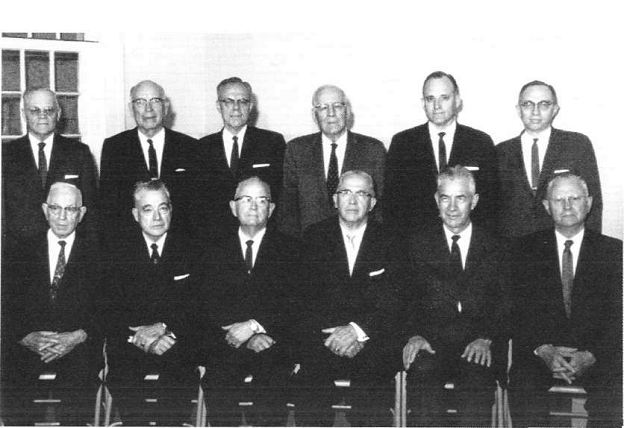 Quorum of the Twelve Apostles, 1961–62. Front row, left to right: President Joseph Fielding Smith, Harold B. Lee, Spencer W. Kimball, Ezra Taft Benson, Mark E. Peterson, Delbert L. Stapley. Back row, left to right: Marion G. Romney, LeGrand Richards, Richard L. Evans, George Q. Morris, Howard W. Hunter, and Gordon B. Hinckley
Quorum of the Twelve Apostles, 1961–62. Front row, left to right: President Joseph Fielding Smith, Harold B. Lee, Spencer W. Kimball, Ezra Taft Benson, Mark E. Peterson, Delbert L. Stapley. Back row, left to right: Marion G. Romney, LeGrand Richards, Richard L. Evans, George Q. Morris, Howard W. Hunter, and Gordon B. Hinckley
When illness comes, the man I know watches tenderly over the afflicted one and waits upon him. It is their father for whom they cry, feeling his presence a panacea for all ills.”[3] His daughter Amelia McConkie recalled that “he never resorted to physical punishment for any misbehavior on our part, but would put his hands on our shoulders and say in a very hurt tone, ‘I wish my kiddies would be good’ That was the most effective punishment he could give us and was far worse than any spanking could have been, simply the thought that we had hurt him.”[4]
His mercy extended readily and frequently beyond his own family. “[Once] a peddler woman came to his door with an array of pins, buttons, shoe laces, and other gewgaws. Since she had nothing that was really needed in the household, she was turned away by the child who answered the door. When the child’s father [President Smith] learned what had happened, he gave the child a dollar with the instructions to go and buy something from the peddler ‘whether they needed it or not’ and that they were never to ‘turn anyone away that was in need.’”[5]
Born 19 July 1876, a year before President Brigham Young died, and having lived almost one hundred years of Church history, Joseph Fielding Smith had been under the guidance of every president of the Church who held that office before him except Joseph Smith, and his noble parentage put him in close proximity to that great man. His grandfather was the Prophet’s brother, Hyrum, and his father was the sixth president of the Church, Joseph F. Smith. Joseph Fielding knew the hardships of pioneer life and the rigors of early morning and late evening chores. As a young boy of seven, he mistakenly “showed off” his competence at milking and acquired the job permanently. He knew the harshness of cold nights and interrupted sleep as he harnessed his mother’s horses many times so she could go out to perform her services as a midwife. He knew the privation of Christmas—one in particular where his father wandered the Salt Lake City streets in search of some warming surprise for his children and returned with his hands as empty as his purse.[6]
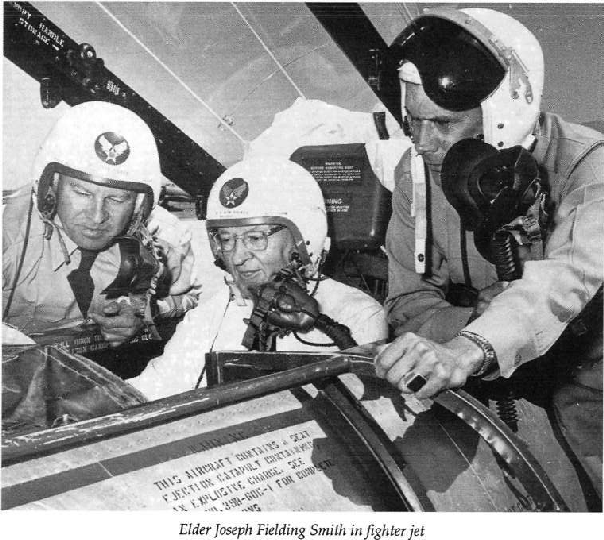
Young Joseph, in April 1898, married Louie Shurtliff, a beautiful dark-haired girl who boarded with the Smiths while she attended the University of Utah. Only a year later the young husband received a mission call to England. Both he and his wife accepted the separation bravely. In 1908, seven years after his return, Louie died, leaving him with two little daughters. Later that same year he married Ethel G. Reynolds, and together they had nine children. In 1937, however, she was also taken from him. Jessie Evans Smith, a well-known contralto soloist in the Tabernacle Choir, became his wife in 1938 and traveled with him, speaking and singing throughout the Church. She also preceded him in death.
President Smith spent his entire life in the service of the Lord. Shortly after his mission he began working in the Church Historian’s Office, becoming assistant Church Historian in 1906. While holding that office, the call came to fill a vacancy in the Quorum of the Twelve, where he served for sixty years before becoming president of the Church in 1970. He served as Church Historian for half a century and also became the director of the Genealogical Society and president of the Salt Lake Temple. His son-in-law Bruce R. McConkie described his labors: “Perhaps no man in this dispensation has traveled more miles, attended more meetings, preached more sermons, performed more ordinances, or written more voluminously in proclaiming the truths of salvation than he has.”[7]
His list of written works comprises twenty-five volumes—many of which were written in response to the demands of his listeners for copies of his numerous speeches. He spent his life reading and studying the scriptures and becoming educated by the Spirit of the Lord; his scholarship on doctrinal subjects was unsurpassed, as he had been an avid student of the gospel from his childhood. He wrote: “I remember that one thing I did from the time I learned to read and write was to study the gospel. I read and committed to memory the children’s catechism and primary books on the gospel. Later I read the History of the Church as recorded in the Millennial Star. I also read the Bible, the Book of Mormon, Pearl of Great Price, and the Doctrine and Covenants, and other literature which fell into my hands.”[8]
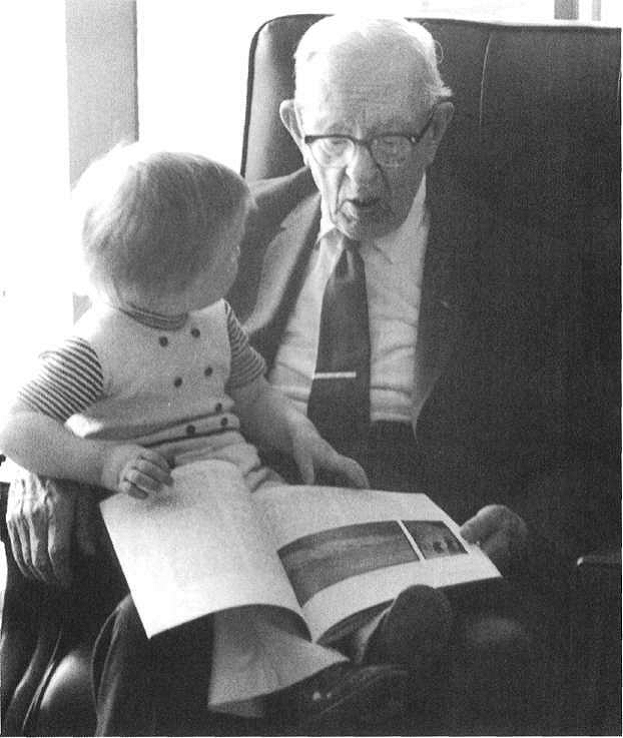 President Joseph Fielding Smith with young Church member
President Joseph Fielding Smith with young Church member
His life beautifully fulfilled a patriarchal blessing full of magnificent promises given to him when he was twenty: “It shall be thy duty to sit in counsel with thy brethren and to preside among the people. It shall be thy duty also to travel much at home and abroad, by land and water, laboring in the ministry, and I say unto thee, hold up thy head, lift up thy voice without fear or favor as the Spirit of the Lord shall direct, and the blessing of the Lord shall rest upon thee. His Spirit shall direct thy mind and give the word and sentiment that thou shalt confound the wisdom of the wicked and set at nought the councils of the unjust.”[9]
A few of the many areas of progress made in the Church during President Smith’s two and a half years as its leader were the consolidation of the Church magazines into the Ensign, New Era, and Friend; the setting aside of Monday night as family home evening throughout the entire Church; the advancement of the meetinghouse library facilities; the establishment of the Social Services Task Committee designed to aid members with psychological problems where professional help was needed; the founding of Church Health Services; and the holding of area conferences.
President Smith died in perfect peace at his daughter’s home on 2 July 1972. All his life he was so close to heaven that it seemed a joyous event to know that he had passed through the veil to unite with his loved ones. Aware that his mortal life would soon end, President Smith left this stirring testimony with members of the Church at a general conference session shortly before his death: “As I stand now, in . . . the twilight of life, with the realization that in a not-far-distant day I shall be called upon to give an account of my mortal stewardship, I bear testimony again of the truth and divinity of this great work. . . . I am sure that we all love the Lord. I know that he lives, and I look forward to that day when I shall see his face, and I hope to hear his voice say unto me: ‘Come, ye blessed of my Father, inherit the kingdom prepared for you from the foundation of the world.’”[10]
Notes
[1] “‘Another Prophet is Sent,’” Church News, 31 January 1970, 16.
[2] Conference Report, October 1970, 153.
[3] Bryant S. Hinckley, “Joseph Fielding Smith,” Improvement Era, June 1932, 459.
[4] Francis M. Gibbons, Joseph Fielding Smith: Gospel Scholar, Prophet of God (Salt Lake City: Deseret Book, 1992), 228.
[5] Joseph F. McConkie, True and Faithful: The Life Story of Joseph Fielding Smith (Salt Lake City: Bookcraft, 1971), 72–73.
[6] Joseph Fielding Smith Jr. and John J. Stewart, The Life of Joseph Fielding Smith: Tenth President of The Church of Jesus Christ of Latter-day Saints (Salt Lake City: Deseret Book, 1972), 54–55.
[7] Bruce R. McConkie, “Joseph Fielding Smith: Apostle, Prophet, Father in Israel,” Ensign, August 1972, 27.
[8] Joseph Fielding Smith, Answers to Gospel Questions (Salt Lake City: Deseret Book, 1963), 4: v.
[9] A. William Lund, “Elder Joseph Fielding Smith: Forty Years an Apostle,” Improvement Era, April 1950, 315.
[10] Joseph Fielding Smith, “Let the Spirit of Oneness Prevail,” Ensign, December 1971, 136.
